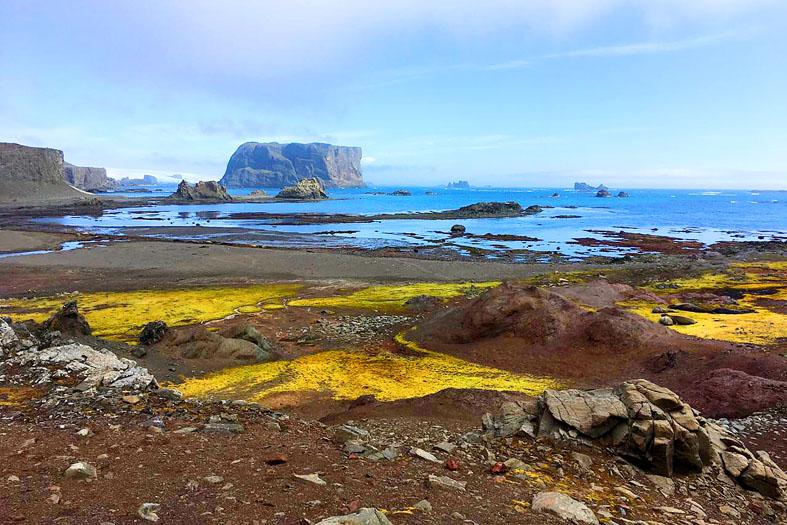Antarctica, once the only continent not affected by the COVID-19 pandemic, has reportedly recorded its first cases. The 36 new infections are among people stationed at a Chilean research base and include 26 members of the Chilean army and 10 maintenance workers.
Spanish-language media reported the outbreak at the General Bernardo O’Higgins Riquelme research base on Monday.
“Thanks to the timely preventive action ... it was possible to relieve said personnel, who, after being subjected to a medical control and the administration of a PCR [polymerase chain reaction] test ... turned out to be positive for COVID-19,” Newsweek magazine reported the Chilean army as saying in a statement.

Photo: AFP / Chilean Antarctic Institute
It added that three crew members on a ship providing support to the base have also tested positive since returning from their mission to Antarctica.
The 36 who tested positive have since been evacuated to the city of Punta Arenas in Chile, where they are reported to be under isolation and in good condition.
Trying to keep the virus at bay in Antarctica has come at a cost. All major research projects in the Antarctic have been halted. As a result, research by scientists around the world has been interrupted.
While the continent has no permanent residents, 1,000 researchers and other visitors are staying there over winter, the Associated Press (AP) reported.
In March, as the world locked down in response to COVID-19’s rapid spread, the Antarctic programs agreed the pandemic could become a major disaster.
With the world’s strongest winds and coldest temperatures, the continent — about the size of the US and Mexico — is already dangerous for workers at its 40 year-round bases.
According to a document by the Council of Managers of National Antarctic Programs seen by the AP: “A highly infectious novel virus with significant mortality and morbidity in the extreme and austere environment of Antarctica with limited sophistication of medical care and public health responses is high risk with potential catastrophic consequences.”

US President Donald Trump yesterday announced sweeping "reciprocal tariffs" on US trading partners, including a 32 percent tax on goods from Taiwan that is set to take effect on Wednesday. At a Rose Garden event, Trump declared a 10 percent baseline tax on imports from all countries, with the White House saying it would take effect on Saturday. Countries with larger trade surpluses with the US would face higher duties beginning on Wednesday, including Taiwan (32 percent), China (34 percent), Japan (24 percent), South Korea (25 percent), Vietnam (46 percent) and Thailand (36 percent). Canada and Mexico, the two largest US trading

China's military today said it began joint army, navy and rocket force exercises around Taiwan to "serve as a stern warning and powerful deterrent against Taiwanese independence," calling President William Lai (賴清德) a "parasite." The exercises come after Lai called Beijing a "foreign hostile force" last month. More than 10 Chinese military ships approached close to Taiwan's 24 nautical mile (44.4km) contiguous zone this morning and Taiwan sent its own warships to respond, two senior Taiwanese officials said. Taiwan has not yet detected any live fire by the Chinese military so far, one of the officials said. The drills took place after US Secretary

CHIP EXCEPTION: An official said that an exception for Taiwanese semiconductors would have a limited effect, as most are packaged in third nations before being sold The Executive Yuan yesterday decried US President Donald Trump’s 32 percent tariff on Taiwanese goods announced hours earlier as “unfair,” saying it would lodge a representation with Washington. The Cabinet in a statement described the pledged US tariffs, expected to take effect on Wednesday next week, as “deeply unreasonable” and “highly regrettable.” Cabinet spokeswoman Michelle Lee (李慧芝) said that the government would “lodge a solemn representation” with the US Trade Representative and continue negotiating with Washington to “ensure the interests of our nation and industries.” Trump at a news conference in Washington on Wednesday announced a 10 percent baseline tariff on most goods

‘SPECIAL CHANNEL’: Taipei’s most important tasks are to stabilize industries affected by Trump’s trade tariffs and keep negotiations with Washington open, a source said National Security Council Secretary-General Joseph Wu (吳釗燮) arrived in the US for talks with US President Donald Trump’s administration, a source familiar with the matter said on Friday. Wu was leading a delegation for a meeting known as the “special channel,” the Financial Times reported earlier. It marked Trump’s first use of the channel since returning to the White House on Jan. 20. Citing a source familiar with the matter, the Financial Times reported that Minister of Foreign Affairs Lin Chia-lung (林佳龍) was also a part of the delegation. The visit came days after China concluded war games around Taiwan and amid Trump’s